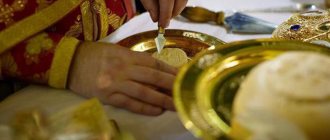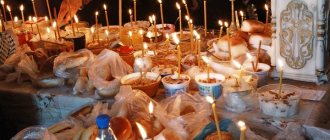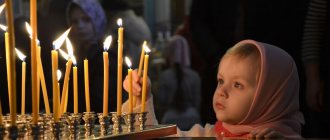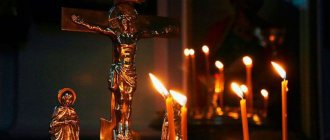How to remember for 9 days? What should you do and what shouldn't you do? This is discussed in detail in the article. Body, soul and spirit are all creations of God. If the first is of a temporary nature, then the rest live forever. Today we will talk about why they commemorate on the 9th day, why they do it. The basic rules of this event will also be presented, it will be described how to organize everything correctly, when and where.
Of course, an important ritual that helps the dead pass on to another world is the wake on the 9th day.
Where is the soul after a person has died?
According to Orthodox canons, it is believed that the soul of the newly deceased does not depart as intended by God on the day of death. For another 40 days after it leaves the body, the soul remains on earth. During this period, relatives pray for the deceased. The 3rd, 9th and 40th days are celebrated in a special way.
Why do this? Why are they commemorated on the 9th and 40th days? The meaning of commemorations these days is to pray for the deceased before God. Note that 9 is a sacred number. After a person has died, his body rests covered with earth. At the same time, the soul continues to wander around the Earth.
What happens on the 9th day? The afterlife begins from the first day. On the 3rd day, the soul of the deceased leaves his native walls. During this period, she goes on a 9-day walk. During these six days she goes through a special journey. At this time, she is preparing for a personal meeting with the Almighty. On the 40th day the journey ends.
Why is it remembered on the 9th day after death? These events help the deceased to stand before the throne of God, the Judge, with fear and trembling. Let us note that in God's hierarchy the angels have their own ranks. After a 9-day stay on the posthumous path, the choice of angels ends. They act as defenders (lawyers) in God's court. Each of them will ask God for mercy. At the same time, he will be provided with evidence of the righteous life of a person who died 9 days ago.
The first three days after death, when the soul is still near the living, a guardian angel stays next to it. The soul enters heaven for dating on the fourth day. While the verdict has not yet been pronounced, everyone finds themselves in heavenly spaces. This is done so that the soul has the opportunity to rest from the pain that haunted it on earth. All the sins of the deceased are also shown.
How to properly set the table
After prayer, the meal begins with a special ritual dish - kutya (sochiva). It is prepared from grains (wheat, rice, corn, millet, etc.). This dish has a sacred meaning. The grain dies when cooked. Honey, poppy seeds, raisins, jam, and nuts, which are used to flavor kutya, symbolize heavenly pleasure. They are placed on the funeral table as a wish for the newly departed to have a heavenly stay in eternity. If it is not possible to consecrate this ritual dish in church, it is sprinkled with holy water three times at home.
In some regions and districts, jelly, compote, pancakes and pies are still considered obligatory dishes. In fact, the church does not determine the menu of the funeral table with such categorical precision. Theologians insist that commemorations should not incline those who attend them to gluttony. Therefore, you should choose simple dishes for them, without any special culinary delights. The number and choice of dishes depends only on the desires and tastes of those who organize the funeral meal. It is only important to remember about fast days. There is no need to worry if the commemoration took place on a fast day. There are many delicious Lenten dishes that make it easy to put together a good meal. Taking all this into account, fast or lenten soups, main hot courses, various snacks, and sandwiches are often placed on the funeral table.
Alcoholic drinks at the funeral table are condemned not only by the church, but also by psychologists. Relatives already suffering from the stress associated with the loss of a loved one can aggravate their gloomy state with alcohol. According to psychologists, such libations have a detrimental effect on the psyche of the mourners.
Meaning of 9 days
As you understand, angels bring the deceased to the throne of God. After a conversation with the Almighty, the soul goes to hell. This decision is not final. We can say that the soul goes there for acquaintance. During such a journey, various difficult obstacles arise in front of the deceased (more precisely, his soul). He must pass all the tests. Their difficulty depends entirely on the temptations encountered along the way.
Those souls who have been able to show that good triumphs over evil can expect a change of heart at God's judgment. It is very likely that they can count on forgiveness.
What is the importance of the 9th day? The fact is that the deceased has not yet been determined on his path. The memories of relatives, as well as their prayers, will provide undeniable help to the deceased. The memory of the good deeds of the deceased, his life and forgiveness of the offended bring peace to the soul.
According to Orthodox canons, it is believed that one cannot constantly mourn the deceased. This is how you keep him on the ground by your behavior. When family and friends find peace, they give peace to the departed person.
When the soul goes through the journey in hell, then sinners have the opportunity to repent. At the moment, it is the prayers of the living that provide strong support for the dead on this difficult path.
It is very important to order a prayer service on the 9th day. After which, of course, you must definitely end the day with a wake. The prayer that sounds during commemoration helps the deceased to pass these difficult hellish trials.
The prayers of living people are filled with requests for the deceased to join the angels. If the Almighty wills, then the deceased will become a guardian angel for one of his relatives.
How to count the 9th day correctly?
When calculating, you need to take into account not only the day, but also the time. The funeral must be held no later than the ninth day. Usually they are even done earlier. There is no way to organize a wake later.
For example, if a person died after lunch, then a wake should be held eight days later. Please note that the date of death and the time of the funeral are in no way related to each other. According to Orthodox customs, it is believed that the body is buried on the second or third day. But it also happened that the date of burial was postponed even to the sixth and seventh day. Based on this, the date of the funeral is calculated only from the time of death.
Funeral according to traditions
How to remember for 9 days after death? Now we will tell you in detail. Let us note that a wake is a necessary, but not very simple, ritual in order to pay tribute to the memory of the deceased. At the same time, leaving in his mind all the best from his life.
Funerals on the 9th day are not usually held in a cemetery. You can simply come to the grave of the deceased for your loved ones. You can arrange a funeral at home. If it is not possible to do this there, then you can hold the event in a cafe.
It is customary that people are not invited to the funeral dinner. They must come on their own. Of course, you need to tell them when and where the event will take place. It is also necessary to express the desire for these people to be present at the funeral dinner, which begins and ends with the Lord's Prayer.
4 main fasts and one-day fasts in Christianity
One of the traditions of Orthodoxy is fasting on Wednesday and Friday (the day of betrayal and salvation of Jesus Christ). Moreover, its roots go far back to ancient times. For each of these days, special food is prepared. It is possible to eat oil and fish, but in a certain order. In addition, you should prepare a Lenten lunch for the funeral. Some food restrictions increase the alms that a person gives to the soul of the deceased through a funeral meal, giving a new meaning.
The Gospel mentions the “fast of hypocrites,” when those fasting take on a mournful expression on their faces and become gloomy, which is condemned by Christ, for such behavior is considered indicative - this indicates that they are observing fasting.
Food prepared during Lent may differ significantly from the traditional menu, but not for the worse:
- Lent (before Easter) - duration is 7 weeks, and in the 1st, 4th and 7th weeks the rule is observed - complete abstinence from fasting food, butter is allowed on Wednesdays and Fridays;
- Petrov: duration - 6-8 weeks, this fast is not so strict, on weekends and on religious holidays it is allowed to cook fish using different methods;
- Assumption - the shortest fast, it is recommended to give up inappropriate food for only 2 weeks in the second half of August;
- Christmas: lasts more than 1 month, begins in November, ends on January 6, it is allowed to eat fish on weekends and holidays, oil is excluded every 1, 3, 5 days of the week.
We set the table correctly for a funeral dinner. What dishes can you cook?
How to remember correctly for 9 days? We need to arrange a special lunch. Just remember that it has nothing to do with celebration. During this dinner there can be no laughter, fun and songs.
The Church does not recommend placing on the table and consuming alcoholic beverages that cause inappropriate behavior. In general, drunkenness is a great sin. And, as you know, during wakes people pray for the forgiveness of sins, not only of the dead, but also of the living. During lunch on the 9th day, if you indulge in drunkenness, you can harm the deceased.
How to remember for 9 days after people have prayed? Then each of those present puts on a kutya, which was specially prepared and consecrated in the church. Note that if it was not possible to consecrate the food, then it can be sprinkled with holy water three times.
Traditional dishes for funerals
Funerals are an ancient tradition. It lies in the fact that the people helping with the burial must be fed. That is, the point is not in the feast, but in the food. People who are not familiar with the traditions try to make a real feast out of the wake. They prepare pickles and strive to make the menu varied and “expensive.” It is not right.
The point is to feed people simply and nutritiously. The wake is a dinner. It should consist of three courses. Something like this:
- first (usually borscht);
- second course;
- compote with a bun or pie.
No excesses in the form of cuts and snacks should be placed on the table. Firstly, people are not supposed to linger at the feast. Secondly, this is not a holiday. Extra “gatherings” are disrespectful to the memory of the deceased.
Approximate funeral menu
First option:
- borsch,
- mashed potatoes with a chop,
- Uzvar and pie.
It is necessary to calculate in portions. Naturally, if a funeral dinner is being held at home, then you need to prepare it “in reserve.” After all, people you didn’t expect may come to the funeral. It will be inconvenient to kick them out immediately after burial.
Second option:
- meatball soup,
- boiled rice, battered fish,
- compote and bun.
Third option:
- noodle soup,
- buckwheat porridge, fried chicken,
- jelly and cookies.
Kutya must be placed on the table. This dish is not discussed or changed. Whatever you cook, kutia must be on the menu. It has a more spiritual meaning than a physical one.
The main dish is kutia
Kutia is a sweet grain porridge. Each region prepares it differently. Some cook from rice, some from wheat. You just need to be able to cook the grain so that people can eat it. Therefore, here is a recipe for kutya made from rice. This portion is enough for forty people.
Universal recipe for funeral kutia
Cook half a kilo of rice until done. When it cools down, add two hundred grams of dried apricots, raisins, and one hundred grams of honey. You can also add crushed nuts, candied fruits, and other fruits. This is at the chef's request. This dish is placed on the table in bowls or salad bowls.
Those who came to the wake should take a spoonful and eat it before starting the main meal.
Please note that nowadays not everyone is aware of this tradition. It is advisable to simply tell people what needs to be done (or show by example).
In addition, it is customary to wear kutya to the Temple for a memorial service. The priest blesses her before the memorial ceremony.
How are funerals held?
This feast traditionally ends the funeral ceremony. That is, people who come from the graveyard are invited to the table. Everyone must wash their hands before entering the premises. To do this, place a washbasin or a bucket of water and a towel outside. It is considered bad luck to enter any premises with unwashed hands after a cemetery. This must be taken into account.
One seat at the table must be left unoccupied. It is prepared “for the deceased.” Close people sit nearby. The feast begins with the reading of the “Our Father” prayer. Usually this is done by one of the older family members. Sometimes everyone reads Psalm 90 together. But this is optional.
The hosts invite all participants in the funeral ceremony to the table with the words:
“Please share our grief.”
It is not customary to talk loudly at the table, much less swear, use foul language or laugh. By the way, sharp objects are also not used. Regardless of the menu, only spoons are served at the table (forks are not used). The feast should not last long. Everyone who ate gets up and leaves, after expressing condolences to their family and friends.
Alcohol should be mentioned separately. The clergy do not recommend putting it on the table at all. But many people are sure that in this way they are violating folk traditions. Therefore, in each individual case, people decide for themselves what to do. If the owners believe that alcohol is necessary during the wake, then they buy vodka and red wine. Usually, "Cahors". This drink is considered “church”.
Guests are poured into glasses no more than three times.
Drinking during the wake is strictly prohibited. That is, it is necessary to ensure that no one drinks too much. Please note that everyone is welcome to attend the first wake. Among them there may be completely random people, hunters for “free booze”. You should keep an eye on the mini.
Meals for 9 days, 40 days, six months, a year
These dates are traditionally considered “family” dates. It is not customary to come to these funerals without an invitation or warning. The hosts usually know how many people are expected for dinner. On this day, the menu can be slightly diversified, as the tone of the feast changes. It is not held for the purpose of feeding, but to sit and remember the deceased.
But this does not mean that a banquet should be held. You can add a couple of appetizers or salads and cold cuts to your regular lunch. Alcohol should be handled in the same way as during the first funeral dinner. You should not turn a mournful meal into a cheerful feast. Approaching the table, you need to read “Our Father”, then everyone sits down and has a leisurely conversation, remembering only the good things from the life of the deceased.
The more time passes after the funeral, the fewer people come to the wake. That is life. Everyone has their own business. Therefore, a memorial dinner is not a strict tradition for six months or a year.
At this time, only the closest ones gather. It is customary to treat everyone else with sweets. Most often, people buy candies and cookies.
They are distributed to children, employees at work, neighbors or just strangers.
Source: https://your-magic.ru/chto-gotovjat-na-pominki/
Funeral kutia
As has already become clear, the main dish, that is, what is remembered for 9 days, is kutia. Each region has its own unique food preparation traditions. But the main components are grain and honey. The following cereals can be used in cooking:
- millet;
- rice;
- corn;
- wheat.
Let us note that it is not by chance that grain is chosen to prepare this dish. It has a sacred meaning. What is meant here is that the seed dies when cooked, just like a person dies. The latter can be reborn in the Kingdom of Heaven in a new appearance. To wish the deceased a heavenly life, poppy seeds and honey are added to kutya.
Raisins and nuts are not always added to this lean dish. This is because they symbolize healthy life and well-being. Symbols of heaven are sweets such as honey and sugar. They are also added to kutya. Don't turn a funeral dinner into a waste of time. This time is reserved for consoling loved ones and remembering the deceased.
Recipes for the funeral table. Drawing up a funeral menu
In the Russian Orthodox Church there are traditions, the observance of which is mandatory when holding a funeral service. Funeral services are held on the third, ninth and fortieth day after the death of the deceased.
On them, relatives and friends have the opportunity to remember the good deeds of the deceased and pray for the repose of his soul.
The conversation should take place at a set table, in a calm environment conducive to conversation.
When organizing a funeral table, you should carefully consider the choice of treats. Below is a description of the main dishes that must be on the table.
Funeral menu recipes
The main dish that is present in funeral recipes is kutia. It is prepared from wheat grains, rice or barley. Add raisins and honey to the finished porridge. Kutya is illuminated after the funeral service; its preparation carries great meaning. Honey and raisins symbolize the bliss of eternal life in heaven.
Another traditional dish is pancakes. The Slavs associated them with the sun, rebirth, and the beginning of a new life. They are usually served with honey. You can also add dried fruits and nuts to honey. On the table they can lie on a common dish, but it is better to put several pancakes for each guest. If the funeral is held on the day of Lent, the pancakes should be lean, without milk or eggs.
It is also customary to serve hot soups, borscht or cabbage soup at funerals. Warm dishes will warm and satisfy guests.
Try to prepare simple recipes for the funeral menu, without any frills. The food should be tasty, but the main thing on this day is to remember the deceased. The table setting should correspond to the purpose of the funeral dinner; there is no need to be sophisticated when choosing a tablecloth and cutlery.
The main drink that should be offered to guests: jelly for funerals. The presence of alcoholic beverages on the table is not approved. It is believed that people can drink too much alcohol and lose control. This insults the memory of the deceased. Therefore, if you decide to serve alcohol, make sure that guests drink it in moderation.
Menu for funerals recipes. Traditional dishes
Pancakes. Recipe for a funeral
Such pancakes are prepared when a funeral dinner does not take place on a fast day.
Products you will need for cooking:
Eggs - 8 pcs, 4 and a half tbsp. premium flour, a liter of milk, you can replace kefir, water - 5 tbsp, sugar - 7 tbsp, 1 tsp soda, 9 tbsp vegetable oil, salt to taste.
Mix the products in a deep bowl using a blender until smooth. The finished dough should rest for about half an hour. Fry pancakes in a hot frying pan, pouring a thin layer of batter onto it. Periodically grease the pan with vegetable oil. The finished pancakes are beautifully rolled up, placed on plates, and placed on the table.
Kutya (Rice for a funeral). Recipe
0.5 kg round rice, 0.2 kg raisins, 0.2 kg dried apricots, 4 tbsp. honey, salt.
Dried apricots, cut into small pieces and raisins must be poured with boiling water for half an hour, then drained.
Pour the washed rice with cold water, add salt and cook over low heat. Do not disturb the rice when cooking. To prevent the rice from boiling, leave it on the stove for no more than ten minutes after boiling.
After this, remove the rice from the heat and keep covered for another ten minutes. Add raisins, dried apricots, honey to the resulting mass and stir thoroughly. The prepared kutya is placed on the table in small saucers.
Everyone who comes to the wake must try kutya.
Pancakes for fasting day
This recipe is perfect for a fast day.
To get lean pancakes, take:
Flour - 4 and a half cups, water - 7 cups, 2 tsp dry yeast, sugar - 4 tbsp, salt, vegetable oil.
Heat the water a little and dissolve the yeast and sugar in it, wait ten minutes. While stirring, add flour and salt. Blend with a blender until smooth and add butter. Place the finished dough in a warm place for half an hour. Bake thin pancakes in a hot frying pan. Ready-made lean pancakes can be poured with honey.
Recipes for a funeral table on the day of a funeral. Other dishes desirable for a funeral table
Funeral recipes for first courses
Lenten borscht
2-3 kg of cabbage (fresh or pickled, your choice), 1 kg of beets, 0.5 kg of onions, 0.5 kg of carrots, 0.3 kg of potatoes, 200 g of vegetable oil, 200 g of tomato paste, 10 liters of clean water, salt, seasonings and salt of your choice.
Cut the peeled potatoes into large pieces and throw them into salted boiling water.
Add chopped fresh cabbage to the water after the potatoes. If you use pickled potatoes, you need to rinse them and put them in the pan when the potatoes are already cooked. The potatoes will be ready about twenty to twenty-five minutes after they boil.
Fry the soup dressing separately in a frying pan. Two minutes before removing, add tomato paste to the pan. The beets are cooked in a separate frying pan. Before frying, cut it into small strips.
Bring cabbage and potatoes to readiness and add fried vegetables to them. After the soup boils again, keep it on the fire for another five minutes and remove. Spices and herbs are added to taste. After the borscht, you need to let it sit for about fifteen to twenty minutes before serving.
Funeral lunch. Basic rules of behavior
How to remember the dead for 9 days? Lunch should start with the first course. Usually it is borscht. Also on the funeral menu there is porridge, often pea. This dish is served with cutlets, fish or poultry.
Many people are interested in how to remember for 9 days and what should be served? Now let's try to understand this issue. The menu at a wake must include porridge (often pea), accompanied by cutlets, fried fish or poultry.
The receiving party chooses the cold appetizers themselves. As for drinks, there should be either compote or uzvar on the table. At the end of lunch, thin pancakes (with cottage cheese or poppy seeds) or pies with sweet filling are served.
How to behave at a cemetery and funeral
The death of a loved one or just an acquaintance always means a sad event. Funerals that occur after death on the 3rd, 9th and 40th day are accompanied by sadness from parting with the deceased. It is customary to wear clothes in dark tones or modest, discreet colors to a funeral or memorial. Bright colors, abundant cosmetics and jewelry look inappropriate on this day. Women are required to wear a dress or skirt below the knees; even on the hottest days, it is customary to cover their shoulders. The head and décolleté area should be covered with a dark scarf or scarf. Men should wear trousers, not a bright shirt that covers their shoulders. In church or when saying goodbye to the deceased in a cemetery, it is customary to take off your headdress, even in extreme cold, with exceptions only for very young children. When saying goodbye, you can say a few kind words and make a short speech.
The purpose of a wake is not to consume food!
Note that you don’t need to prepare a lot of food so as not to fall into gluttony. In general, rituals during the taking of funeral food are an invention of people. The meal is not the main event of the day. People should just quietly remember the deceased. Don't talk bad about him. This is necessary in order not to harm him during his journey through hell.
If you talk negatively about the deceased on the 9th day, then there is a chance that he will receive a terrible sentence. Let us note that all the food left after the funeral dinner must be distributed to the needy and the poor.
Behavior in church
We have already figured out how to remember for 9 days. For Orthodox loved ones, it is a prerequisite that they be present at the service on the occasion of 9 days.
All people light candles for the repose of the deceased according to this plan:
- First, go to the icon, near which there are candles for the repose. It usually depicts the crucifixion of Jesus. Cross yourself.
- Light the previously purchased candle from other burning ones. If they are not there, then you can use the fire from the lamp. Under no circumstances should you use matches or lighters in this matter.
- Place a lit candle in an empty space.
- Next, ask God to rest the soul of the deceased, be sure to give the full name (the one with which you were baptized).
- Cross yourself, bow, move away from the lamp.
The candles that are placed in the church symbolize a collective request for the deceased. When praying for the soul of the deceased, send requests to God for the mercy of a sinful person. The more people who plead for his forgiveness, the more likely it is that he will receive forgiveness. You can ask both from the Holy Saints, and from the angels and God.










